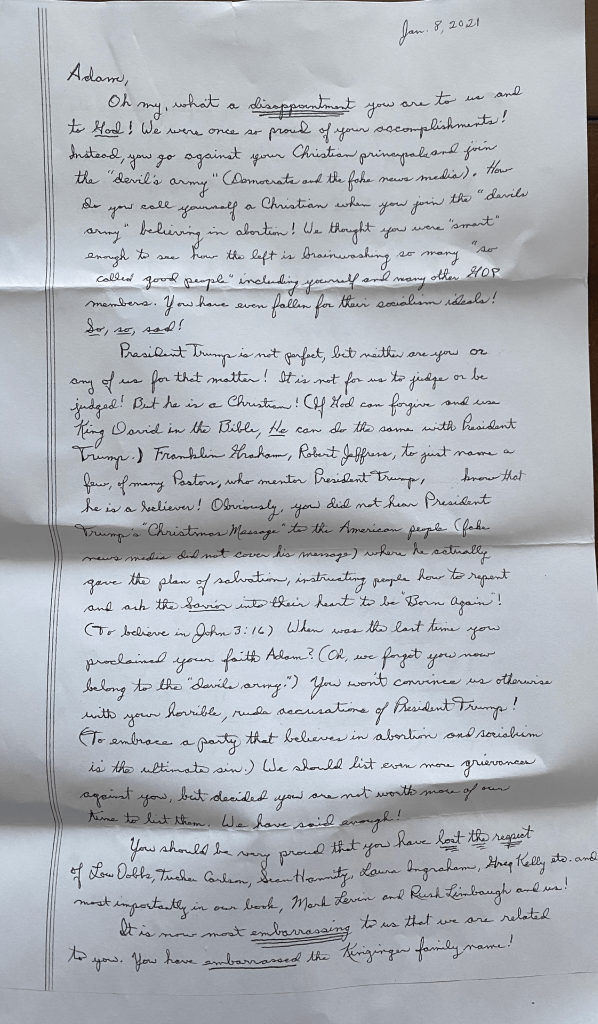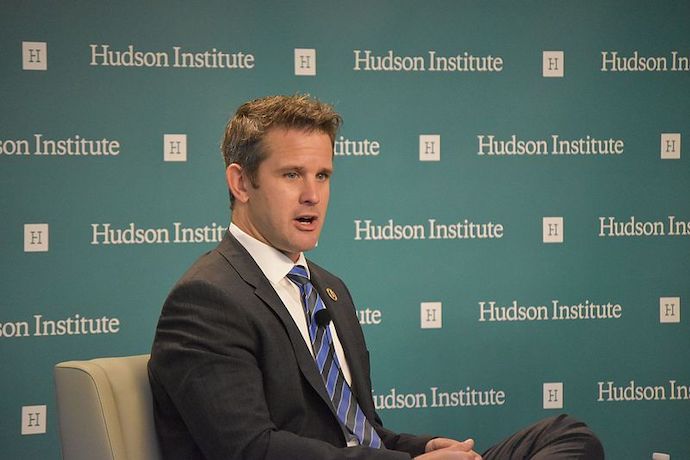This week, Illinois Representative Adam Kinzinger, one of only ten Republicans in the House of Representatives who voted for Donald Trump’s second impeachment, released to The New York Times a letter signed by 11 members of his family eviscerating him for that decision. And that letter [see images below], which accuses Kinzinger of joining “the devil’s army,” which it defines as “Democrats and the fake news media,” is generating buzz in both traditional and social media.
On Twitter, writer Brynn Tannehill noted how the letter neatly illustrates that for the Republican base, politics is a literal holy war:
This letter is… something. But, it illustrates two points. First, most Americans don't realize that the majority of of the GOP base thinks this is a religious war for the soul of the nation. They're willing to abandon democracy FTW. 1/n
https://t.co/45Y1CGCMUI— Brynn Tannehill (@BrynnTannehill) February 16, 2021
For my part, I saw in the letter many classic elements of evangelical shaming and deflection that I’ve been on the receiving end of many times. And, as you can see from the replies I got, I was far from alone in that regard:
The cursive. The sarcasm. The black and white worldview combined with brazen double standards. The invocation of King David. The triple underlining! 🤣
If you grew up evangelical, I guarantee this letter will be familiar in more ways than one #exvangelical #EmptyThePews https://t.co/3ZG9lBoiNj
— Chrissy Stroop (@C_Stroop) February 16, 2021
Yes, it takes serious strength of will to buck the expectations of conformity that are de rigueur in authoritarian Christian communities. The social discipline one faces for coloring even slightly outside the lines can be swift and vicious, and it’s given all the more force by the often directly stated threat of eternal punishment in Hell that comes along with it. But that being said, just because Kinzinger reached a line he could not cross in what he portrays as a faith-based commitment to truth, doesn’t mean he’s willing to treat the disease that racks the Christian Right and the Republican Party, as opposed to merely the symptoms. Indeed, it doesn’t even mean he’s not himself infected.
Kinzinger represents himself as different from his relatives, calling them “brainwashed” by their churches, according to the Times’ reporting. He seems to be more supportive than they are of the separation of church and state (a low bar), although his rhetoric on the matter is rather fuzzy. It’s also noteworthy that Kinzinger, whom Christianity Today identified late last month as a member of Village Christian Church in Minooka, Illinois, himself believes in a literal Devil with powerful influence in society and politics.
In a glowing profile with the headline “Meet the Republican Congressman Who Says His Faith Led Him to Vote for Impeachment,” CT painted Kinzinger as heroically exhorting Christian pastors to start pushing back on their flocks for believing in conspiracy theories, in conjunction with his efforts to “save” the Republican Party. The January 29 profile of Kinzinger is of a piece with commentary by “respectable” evangelicals published throughout the election cycle in CT and elsewhere that essentially begs evangelicals to give up conspiracy theories like QAnon.
What such prominent evangelicals who want to have their cake and eat it too fail to recognize, of course, is that their dogmatic insistence on, for example, treating abortion as equivalent to murder, a position that depends on a fictional notion of fetal personhood and is thus already well down the road of “alternative facts,” leads naturally to anti-pluralist extremism and conspiracy theories that can result in violence like we saw on January 6.
To continue with the virus metaphor, which seems appropriate as the United States continues to struggle to rein in a pandemic that Republicans have egregiously mismanaged, Kinzinger may be “asymptomatic”—at least when it comes to willingness to commit outright violence to overthrow an election as opposed to working within the forms of democracy to deprive the marginalized of power and equality. He seems to me to be no more willing to interrogate the root causes of extremism in his evangelical beliefs than his fellow “respectable” evangelicals Michael Gerson, Ed Stetzer, and David French are. He’s made it clear that he’s as anti-choice as they come, after all, and that he approves of the current Supreme Court, which threatens not just abortion access but also civil rights for all marginalized groups.
For Kinzinger to call this illegitimately packed court “good for Christianity” is at the very least to speak out of both sides of his mouth, and to give approval to the hardline authoritarian tactics through which Donald Trump and Mitch McConnell brought it about. Such rhetoric provides succor to those willing to go further than Kinzinger himself, to do—as the insurrectionists surely saw it—“what needs to be done” to keep “demonic” Democrats out of power.
And while Kinzinger says he likes to keep his faith and his politics distinct, according to CT’s reporting, he has this to say about Satan in light of his criticisms of conspiracy theories and insurrection:
If you think about the Devil’s ultimate trick for Christianity, really, he doesn’t care what the tax rates are. It doesn’t matter. What he cares about is embarrassing the church, and it feels like it’s been successful.
This statement is telling for its prioritization of Christianity’s reputation as opposed to the common good in a democracy. In addition, to project literal demonic activity into the political sphere as “spiritual warfare” is never benign, even if, as in this case, it’s being used to enjoin Christians to be better citizens. This type of thinking may be present in a person who is by nature more reasonable or moderate than most believers in spiritual warfare, but that thinking lends itself far more easily to extremism than moderation.
To be sure, it is tempting to lionize people like Kinzinger for doing the right thing on occasion, particularly in a time when America’s clunky two-party system is utterly broken on the Right. But our acknowledgment of his bravery in upholding the truth about Trump’s incitement of insurrection should be tempered with this truth: “respectable” evangelicalism cannot ultimately mitigate evangelical authoritarianism, because it contains the very same seeds of extremism that sprout and flourish among those who fill the pews.
###







